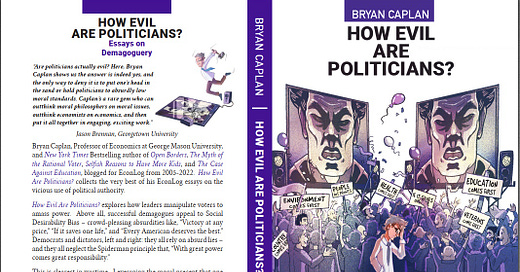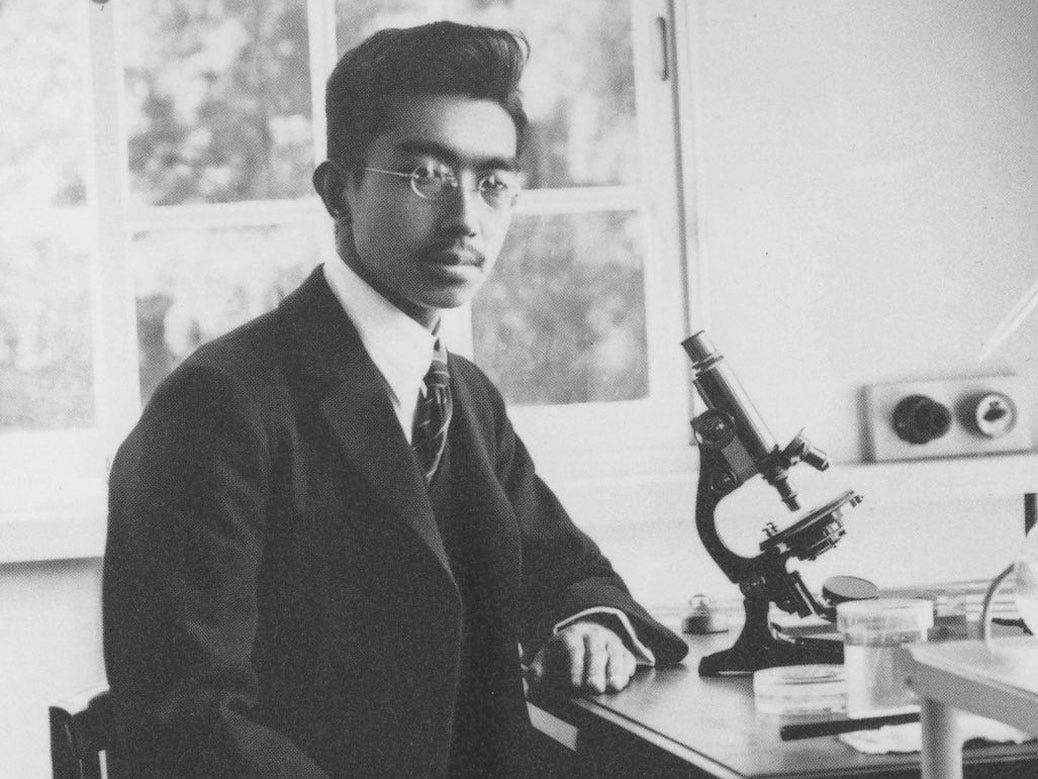
The Demagoguery of Emperor Hirohito
What the Living God teaches us about political psychology
You’ve heard how Japan finally surrendered to the United States after the atomic bombings of Hiroshima and Nagasaki. You’ve heard how Emperor Hirohito went on Japanese radio and informed his people of his decision. But have you ever actually heard what Hirohito told his subjects? The Emperor’s surrender speech is one of the most egregious examples of demagoguery that I’ve ever read. A pile of preposterous pretty political lies for peace. And while we should all embrace the peace, today we’re going to review the lies.
From what I’ve read, most Japanese listeners were barely able to follow Hirohito’s surrender speech due to the archaic courtly language and poor sound quality. But as far as I can ascertain, the Emperor didn’t have a speech writer. This is the way that Japan’s Living God actually spoke about politics. Which, I think you’ll admit, differs in degree but in not kind from the way that politicians around the world continue to speak about politics.
Here’s the full text, with my critique. Emperor Hirohito’s in blockquotes; I’m not.
TO OUR GOOD AND LOYAL SUBJECTS,
After pondering deeply the general trends of the world and the actual conditions obtaining in our empire today, we have decided to effect a settlement of the present situation by resorting to an extraordinary measure.
We have ordered our government to communicate to the governments of the United States, Great Britain, China and the Soviet Union that our empire accepts the provisions of their joint declaration.
This is the part where Hirohito fails to explicitly say the word “surrender.”
To strive for the common prosperity and happiness of all nations as well as the security and well-being of our subjects is the solemn obligation which has been handed down by our imperial ancestors and which lies close to our heart.
Starting multiple wars that killed tens of millions of people is how you “strive for the common prosperity and happiness of all nations”?! That’s what “lies close to your heart”?!
And what sign is there is the emperors of Japan ever cared much about their own subjects, much less foreigners? They ruled in luxury over an impoverished population for millennia.
Indeed, we declared war on America and Britain out of our sincere desire to ensure Japan's self-preservation and the stabilization of East Asia, it being far from our thought either to infringe upon the sovereignty of other nations or to embark upon territorial aggrandizement.
What sign was there that Japan’s survival was ever in danger? China was indeed “unstable” after the Chinese Revolution, but the bloodbath finally ended in 1928. Japan invaded Manchuria three years later, plunging China into over forty more years of horror.
But now the war has lasted for nearly four years.
Fourteen years, but who’s counting?
Despite the best that has been done by everyone – the gallant fighting of the military and naval forces, the diligence and assiduity of our servants of the state, and the devoted service of our one hundred million people – the war situation has developed not necessarily to Japan's advantage, while the general trends of the world have all turned against her interest.
Classic demagoguery. Hyperbolic praise for “everyone,” followed by laughable understatement (“not necessarily to Japan’s advantage”?!) of the catastrophic consequences.
Moreover, the enemy has begun to employ a new and most cruel bomb, the power of which to do damage is, indeed, incalculable, taking the toll of many innocent lives. Should we continue to fight, not only would it result in an ultimate collapse and obliteration of the Japanese nation, but also it would lead to the total extinction of human civilization.
Translation: I’m not just doing this to save my own imperial skin. It’s for all Japan. Actually, it’s for all humanity.
Such being the case, how are we to save the millions of our subjects, or to atone ourselves before the hallowed spirits of our imperial ancestors? This is the reason why we have ordered the acceptance of the provisions of the joint declaration of the powers.
If your motives were so wonderful, what is there to “atone” for?
We cannot but express the deepest sense of regret to our allied nations of East Asia, who have consistently cooperated with the Empire towards the emancipation of East Asia.
“Emancipation of East Asia” via widescale slave labor, mass rape, and mass murder?
The thought of those officers and men as well as others who have fallen in the fields of battle, those who died at their posts of duty, or those who met with untimely death and all their bereaved families, pains our heart night and day.
The welfare of the wounded and the war-sufferers, and of those who have lost their homes and livelihood, are the objects of our profound solicitude.
Amazing that such a soft-hearted fellow could preside over a fourteen-year bloodbath in the first place.
The hardships and sufferings to which our nation is to be subjected hereafter will be certainly great. We are keenly aware of the inmost feelings of all of you, our subjects. However, it is according to the dictates of time and fate that We have resolved to pave the way for a grand peace for all the generations to come by enduring the unendurable and suffering what is insufferable.
A nice illustration of the diction of Social Desirability Bias. When you make an controversial choice, pretend it’s not a choice at all, but “the dictates of time and fate.” It’s the political equivalent of “I love you, but we just can’t be together.”
Having been able to safeguard and maintain the Kokutai, We are always with you, our good and loyal subjects, relying upon your sincerity and integrity.
Loyal? Yes. Good? No. Good subjects wouldn’t have gone along with this murderous nonsense.
Beware most strictly of any outbursts of emotion which may engender needless complications, or any fraternal contention and strife which may create confusion, lead you astray and cause you to lose the confidence of the world.
In plain language, “Don’t try to overthrow me. Which totally didn’t almost happen yesterday. The world won’t like it.”
Let the entire nation continue as one family from generation to generation, ever firm in its faith in the imperishability of its sacred land, and mindful of its heavy burden of responsibility, and of the long road before it.
Japan was never a “family.” No country is, but Japan was especially unfamilial. Its people lived under unbroken despotic rule for thousands of years. And if that wasn’t enough to convince you, a ruinous fourteen-year war of choice should have.
Unite your total strength, to be devoted to construction for the future. Cultivate the ways of rectitude, foster nobility of spirit, and work with resolution – so that you may enhance the innate glory of the imperial state and keep pace with the progress of the world.
Hirohito’s last phrase turned out to be prophetic. Post-war, Japan didn’t just “keep pace with the progress of the world.” The Japanese economic miracle was a pacesetter of world progress. But only because the Japanese tossed “the innate glory of the imperial state” down the memory hole and redirected their superlative conscientiousness to peaceful industry.
If Hirohito’s litany of lies was the only way to end the war, then he shouldn’t have even changed a comma. At least he was lying for a good cause. My point is meta: We should be mindful of the ubiquity of absurd political lies, and reflect deeply on the cross-cultural power of demagoguery. While politicians can lie for the greater good, the abundance of pretty political lies is a strong reason to embrace the maxims, “That government is best which governs least” and “Giving money and power to government is like giving whiskey and car keys to teenage boys.” Economics teaches valuable lessons about whether government can improve the world, but political psychology teaches us the even more valuable lesson that even if government can improve the world, it habitually does the opposite.



















The more I learn about the Japanese government during World War II, it is clear that Hirohito did not unilaterally control Japan, nor its military or political strategy. While he is clearly on the Privy Council, he is not a voting member. I am not defending him or his rhetoric, merely saying that is not in the same position as a Hitler or Stalin at the time. I doubt he presided over much.
The Japanese Prime Minister said basically the same thing, and now you can watch it in perfect English cadence, thanks to AI: https://youtu.be/VknyDke6Byw?si=h1nJv_gWVof1rzOM
Makes a huge difference in how relatable it is.